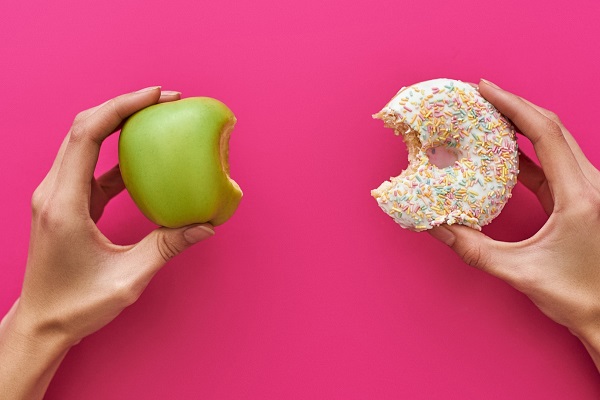Sugar hurts health, however, after eating lots of sugar, we invite multiple diseases. Sugar provides empty calories, that lack essential nutrients like vitamins and fiber, which can contribute to weight gain and obesity. Excessive intake of sugar is closely linked to obesity because sugary foods and drinks don’t make us feel full and lead us to overconsumption of calories. Frequent consumption of sugar can lead us to insulin resistance, where our cells become less responsive to insulin signals, potentially leading to type 2 diabetes. Foods that are high in added sugar are also associated with an increased risk of heart disease due to elevated blood pressure, increased triglyceride levels, and reduced HDL (good) cholesterol.
Table of Contents
ToggleWhy is Sugar Bad for Your health?
In this article, I will explain in detail how sugar is bad for your health in details,
1. Increase Risk of heart disease
Diets that are high in sugar levels have been linked to an increased risk of heart disease, excess intake of sugar may raise your blood pressure increase triglycerides, lower HDL (good) cholesterol, and promote inflammation, all of which are risk factors for heart disease. Sugary foods that elevate triglyceride levels in the blood and Elevated triglycerides are also associated with a higher risk of heart disease.
2. Empty Calories:
As we already know Sugary Foods and drinks often contain a lot of calories but provide little to no essential nutrients like vitamins, minerals or fiber while consuming these empty calories can contribute to weight gain and obesity. If you are overweight and in order to maintain your overall body health you need to stay focused on when you are having a sugar.

3. Insulin Resistance
When you consume a high amount of sugar or sugary foods in a day then it can lead to insulin resistance, where your body cells become less responsive to insulin, then it can directly be welcomed to 2 types of diabetes. Where in type 2 diabetes, the body either resistant to the effects of insulin or doesn’t produce enough insulin to maintain normal glucose levels resulting the high blood sugar levels if it is not managed properly then it can lead to causes serious complications such as cardiovascular disease, nerve damage, kidney damage, and more.
4. Addictive Properties
Similar to the addictive drugs, sugar can trigger the relaes of dopamine in the brains, that lead to cravings and a cycle of overeating sugar and a cycle of overeating sugary rich food, contributing to weight gain and obesity. Likewise, sugar has been shown to have addictive properties which is similar to drugs like cocaine and nicotine.
5. Negative Impact on Dental Health
Did you know that bacteria in he mouth thrive on sugar that produces acids that can erode tooth enamel and lead you to the cavity? Bacteria in the mouth are fed by sugar and produce acids as a byproduct. Similar to this, acids can erode tooth enamel and lead to cavities and tooth decay. Likewise, frequent consumption of sugary foods and drinks without proper oral hygiene can significantly increase the risk of dental problems.
6. Liver Overload
After the high intake of sugar, your liver converts it into glucose and fructose, so consumptions of too much fructose can overload the liver that leads to non-alcoholic fatty liver dieases, NAFLD it is a condition that is becoming increasingly common this days. NAFLD is increasingly common and that can progress to more severe liver conditions such as non-alcoholic steatohepatitis (NASH) and liver cirrhosis over time. The form of fructose, which are found in high-fructose corn syrups and table sugar that liver metabolizes it.
7. Over Weight and Obesity
As i have already mentioned above that, consumption of excessive sugar can contributes to weight gain for several reason. Sugary foods and beverages oftenly contain high levels of calories without offering significant nutritional value, leading to an imbalance between calorie intake and expenditure. Similalry, frequently consumption of sugar can leads us to spikes in bloods sugar levesl which is followes by crashes and also trigger hunger and sweets craving for more sugary foods, , perpetuating a cycle of overeating.
Foods That Contain High Sugar
However, there are various types of foods that contain high level sugar. Besides here are the 9 lists of foods that conatins high level of addeed sugar:

- Soda and sugary drinks: Soda, fruit drinks, energy drinks, and sweetened teas are filled with the added sugar
- Candy and sweets: Candies, chocolates, cookies, cakes, pastries, and other sweetened desserts are typically high in added sugars.
- Breakfast cereals: Many breakfast cereals, especially which are marketed to children, does contain large amounts of added sugars.
- Flavored yogurts: Flavored yogurts often have added sugars to enhance taste, so choosing plain yogurt or ones with no added sugars can be healthier options.
- Condiments: Condiments like ketchup, barbecue sauce, and salad dressings contain added sugars.
- Snack bars: Granola bars, protein bars, and other snack bars can be high in added sugars despite being marketed as healthy snacks.
- Frozen desserts: Ice cream, frozen yogurt, and sorbet can contain considerable in high amounts of added sugars.
- Canned fruit: Canned fruits packed in syrup have added sugars, choose fruit packed in water or its own juice is a better choice.
- Baked goods: Packaged muffins, doughnuts, and sweet breads contain added sugars.
- Processed foods: Many processed foods, including sauces, soups, and ready meals, can have hidden added sugars to enhance flavor.
How to Limit Sugar Intake?
This days it is one of the topped searche question on google, so to make a lot easier for you here are the some list of How to limit sugar intake,

- Read food labels: While buying the goods from market check the ingredients list on packaged foods and beverages to identify added sugars. Look for terms like sucrose, glucose, fructose, corn syrup, and other syrups.
- Choose whole foods: For the better health option choose teh whole fruits instead of fruit juices or canned fruits packed in syrup.
- Cook at home: Try to avoid the outside foods and you can Prepare meals and snacks at home using fresh ingredients. This way, you have control over the amount of sugar added to your dishes.
- Use natural sweeteners sparingly: When sweetening foods or beverages, use natural sweeteners like honey, maple syrup, or stevia in moderation. Be mindful that even natural sweeteners can contribute to overall sugar intake.
- Limit sugary beverages: Try to Avoid sugary drinks like soda, sweetened teas, energy drinks, and fruit juices as much as for you better health option. Instead, choose water, sparkling water, herbal teas, or unsweetened beverages.
- Be cautious with condiments and sauces: Check labels for added sugars in condiments such as ketchup, barbecue sauce, and salad dressings. Even you can make at your self at your home with no added sugars.
- Choose low-sugar alternatives: When purchasing packaged foods, choose options with no added sugars or lower sugar content. Compare products and choose the one with the least amount of sugar.
- Watch portion sizes: Be mindful of portion sizes, especially when eating foods high in natural sugars like dried fruits or yogurt with added fruits.
- Educate yourself: Read about hidden sources of sugars in processed foods and make informed choices when grocery shopping or dining out.
- Gradually reduce sugar: If you’re used to consuming a lot of sugar, gradually reduce your intake over time.
Health Benfits Of Not Consuming Sugar?
There are various postive health benifits of not consuming sugar, here are the some of the list of postive impact on our health,

- Weight management: Cutting back on sugar can help reduce calorie intake, leading to better weight management of weight loss or weight gain and potentially lowering the risk of obesity.
- Improved dental health: Less sugar intake can decrease the risk of tooth decay and cavities, as sugars contribute to the growth of harmful bacteria in the mouth.
- Stable energy levels: Foods high in added sugars can cause spikes and crashes in blood sugar levels, leading to fluctuations in energy. Similalry, avoiding sugar helps maintain more stable energy levels throughout the day.
- Better skin health: Reducing sugar intake can improve skin conditions such as acne and promote healthier-looking skin.
- Reduced risk of chronic diseases: High sugar intake has been linked to an increased risk of type 2 diabetes, heart disease, and metabolic syndrome. Lowering sugar consumption may help reduce these risks.
- Improved mood and mental clarity: Sugar crashes can contribute to mood swings, irritability, and difficulty concentrating. Avoiding sugar can lead to more consistent mood and better mental focus.
- Enhanced immune function: Excessive sugar consumption may weaken the immune system’s ability to fight infections. Cutting down on sugar can support a stronger immune response.
- Better overall nutrition: When you reduce sugary foods and beverages, it tend to make healthier food choices overall, opting for nutrient-dense foods like fruits, vegetables, whole grains, and lean proteins.
- Reduced inflammation: High sugar intake has been associated with increased inflammation in the body, which is linked to various chronic diseases. Lowering sugar consumption may help reduce inflammation levels.
- Long-term health benefits: By reducing sugar intake, you may lower your overall risk of developing chronic health conditions and improve your long-term health outcomes.

Source: Fitterfly
Which country consumed the highest amount of sugar?
As per the research the counntry that produces the high sugar is the United States of America. Americans consume a significant amount of sugar through various sources such as sugary drinks, processed foods, desserts, and snacks.
Countries in Western Europe and some parts of Latin America also tend to have high sugar consumption rates.
However, it’s important to note that this information may vary slightly depending on the source and the specific time period analyzed.
FAQs
Does Sugar afffect Cholesterol Levels?
Yes, High sugar intake, especially from sugary beverages, is linked to elevated triglyceride levels and decreased HDL (good) cholesterol levels, which are risk factors for heart disease.
Can reducing sugar intake improve sleep quality?
Yes by reducing sugar intake stabilize blood sugar levels throughout the day, potentially leading to better sleep patterns and overall sleep quality.
Does sugar contribute to skin issues?
Yes, high sugar intake may exacerbate skin conditions like acne and accelerate skin aging.
How does sugar impact gut health?
High sugar diets can disrupt the balance of gut bacteria, potentially leading to digestive issues and inflammation in the gut.
Also, read more about How Sleep Patterns Affect Blood Sugar Regulation
